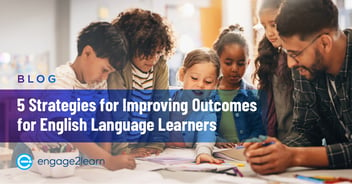The Role of Professional Development in Supporting English Learners
Picture this: Daniel, a sixth-grader who recently moved to the United States with his family, faces the daunting task of learning in English — a language he barely knows.
Despite how much he used to enjoy school, the language barrier leaves him frustrated, disengaged, and, in turn, lagging behind his peers academically and socially. His teachers – though experienced and eager to integrate Daniel into the classroom – lack the targeted support and tools that they need to meet his specific learning needs.
Scenarios like Daniel’s are playing out in K-12 classrooms over and over as English learners (ELs) become a significant portion of the student population. While ELs typically bear the brunt of this dynamic, their English-speaking peers and teachers also feel the effects. As teachers struggle to address every student’s needs, classrooms can become fragmented, with ELs falling behind and English-speaking students missing out on a culturally rich, inclusive learning environment.
Addressing these challenges requires thoughtful, sustained professional development for educators to ensure every student like Daniel can thrive. By providing them with research-backed, job-embedded support, school and district leaders empower teachers to create inclusive, adaptive learning environments in which all students can succeed.
Understanding What Works and What Doesn’t
English learners are the fastest-growing student group across US schools, especially in (but not limited to) urban areas. Teacher training, however, has largely not kept up with this growth. In fact, the vast majority of mainstream teacher training programs in the United States don’t require teachers to be prepared to instruct ELs.
According to this study and others like it, traditional professional development cannot accommodate the targeted support that teachers urgently need. On the other hand, a comprehensive approach that includes job-embedded coaching and training, evidence-based growth in EL-specific competencies, and data-informed insights about the impact of teacher growth on English learners’ success is shown to yield improved teacher effectiveness and learner outcomes.
While the gaps in teacher preparedness ultimately need to be filled systemically, school and district leaders have the strategies and tools to do right by ELs and their teachers now. By implementing ongoing, job-embedded professional development that equips teachers with the proven-effective skills and strategies they need, leaders can chart the course toward improved outcomes across the board.
Strategic Support for Teachers of English Learners
Rather than intermittent, one-size-fits-all training sessions, individualized, job-embedded professional development is critical to achieving meaningful educator growth. engage2learn’s (e2L) approach aims to do exactly that and includes several key strategies designed to improve the skills and effectiveness of educators working with English learners:
01: Develop Competencies/Best Practices for English Learners
To meet the needs of ELs, the first task is to develop EL-focused competencies to serve as a guide for teachers’ growth. For example, e2L partner district Providence Public Schools developed a Multilingual Learners (MLL) Best Practices Rubric, which includes competencies like language proficiency, vocabulary development, and small group instruction. Each competency is broken up into four levels, empowering teachers to self-assess and determine the areas in which they can level up.
02: Implement Job-Embedded Coaching
The next step to ensuring teachers’ growth in competencies is implementing personalized, job-embedded coaching. Whether done one-on-one or in PLCs, in person or virtually, this kind of ongoing support throughout the school year allows space for goal-setting, leveling up, reviewing evidence of implementation, positive and constructive feedback, and celebrating progress. This not only helps in the immediate application of new strategies but also supports the professional growth of teachers over time.
03: Utilize an Educator Support Platform
Using an adaptive educator support platform like e2L’s GroweLab helps educators know that their hard work and growth in EL-focused competencies is having the intended impact on their students. Plus, with its user-friendly data dashboard, leaders can monitor and measure educator growth and student achievement, providing real-time insights for timely, relevant interventions to address the specific needs and challenges of ELs.
Real-World Impact on English Learners
Providence Public Schools, Rhode Island
Across Providence Public Schools, ELs make up 31% of the student population. In partnership with e2L, leaders were able to implement a district-wide coaching and growth plan that continues to result in significant educator growth and improved support for ELs. Check out the case study and the ESSA-validated, correlational study to learn more.
Kirby Middle School, Texas
With an ‘F’ rating from the state, an EL population of 14%, and high teacher turnover, Kirby Middle School was faced with the possibility of a state takeover. In partnership with e2L, just a few months of coaching led to an amazing school turnaround story, including a 13-point gain for ELs in reading and a 14-point gain for ELs in math. You can read the full story here.
 |
 |
 |
Celebrating cultures and building cultural awareness at Providence's Dual Language & Bilingual Education Showcase, June 2024
Final Thoughts
The growing population of English learners in our schools calls for a strategic response from educational leaders. Professional development, specifically designed to address the needs of these students, is essential for not only the success of ELs but of their peers and teachers as well. With a strategic implementation partner like engage2learn, school leaders can implement proven strategies that empower educators to effectively instruct ELs and to excel in an increasingly diverse educational landscape.
For more information on how e2L can support your district in improving outcomes for English learners through professional development, click here.



